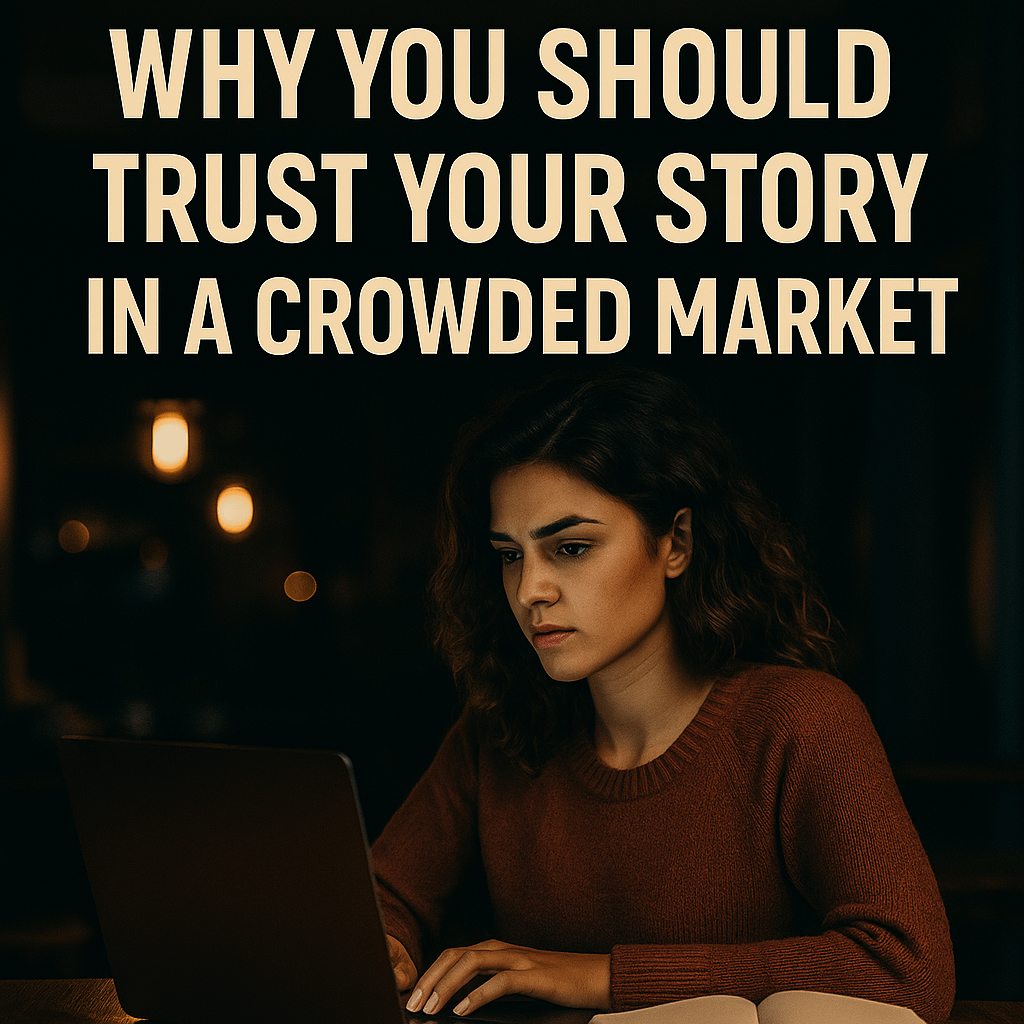Why You Should Trust Your Story in a Crowded Market

Let’s be honest. The market is noisy. Everyone’s selling something, promising more, and shouting louder than the next guy. Algorithms, ads, offers,it’s a never-ending parade of “look at me.”
So how do you stand out when it feels like everyone’s doing the same thing?
Here’s the answer: You tell your story. And you trust it.
Not a recycled slogan. Not what’s trending this week. Your actual story.
Because when everything feels the same, the only thing that can’t be copied, ripped off, or replaced is YOU.
First Things First: What Even Is “Your Story”?
Your story isn’t just how you started or where you went to school. It’s the emotional fingerprint behind everything you do. It’s why you care. It’s the battles you’ve fought, the messy pivots you’ve made, the weird stuff that makes you, you.
It’s not polished. It’s not perfect. But that’s the point.
And if you haven’t taken the time to define it yet, start here:
Passion + Purpose + Differentiator = Your Core Story
- Passion is what fires you up. What gets you out of bed, even when there’s no applause.
- Purpose is your why. Why this matters, and why it should matter to anyone else.
- Differentiator is what you’ve seen, lived, or built that nobody else can replicate.
Put that together, and boom, you’ve got a story that can move mountains (or at least markets).
1. Your Story Is the Only One of Its Kind
No one has lived what you’ve lived. No one has your exact perspective, your scars, or your secret sauce.
In a world where ChatGPT can spit out 10 blog ideas in 10 seconds, what matters more than speed is realness.
Let’s say you’re a coffee company. One of a thousand. But yours sources beans from women-owned farms in regions hit hard by climate change. And you tell those women’s stories, what they grow, how they live, what keeps them going.
That’s not marketing. That’s soul. And it cuts through the noise.
2. Stories Build Emotional Bonds (AKA Loyalty That Sticks)
People don’t buy products. They buy into feelings.
Think about the brands you love. You’re not loyal because of features. You’re loyal because they made you feel something.
Remember Dove’s Real Beauty campaign? They stopped talking about ingredients and started telling real women’s stories. The result? People saw themselves. They felt seen. That campaign didn’t just sell soap, it started a movement.
When you tell stories, you stop selling and start connecting.
3. Your Story Is Your Differentiator in a Sea of Sameness
Everyone can offer fast shipping. Or great design. Or “excellent customer service.” Yawn.
But when you share what makes you different, like your grandma’s recipe that sparked your food business, or the time you got fired and finally built something that mattered—now you’re unforgettable.
People remember you. They share you. They stick with you.
4. Your Story Makes People Do Something
A good story doesn’t just sit there. It inspires action.
It makes someone click “buy,” share your post, sign up for your email, or tell their friend, “You have to check this out.”
It’s the difference between being interesting and being impactful.
5. Storytelling Humanizes Your Brand
Look, people are over big, faceless brands. They don’t want polished. They want personal. They want to know who’s behind the scenes, why you do what you do, and what keeps you up at night.
Your story says: “Hey, I’m not perfect, but I care. I’m building something real. Wanna come along?”
And people say: “Finally.”
6. Your Story Doesn’t Expire Like Trends Do
Trends are like TikTok dances, fun today, cringe tomorrow.
But stories? The real ones? They last.
Think Coca-Cola. Their “share happiness” message hasn’t changed in over a hundred years. The bottle changed. The ads changed. But the story stayed the same.
That’s staying power.
When you root your brand in your story, you don’t have to chase trends. You transcend them.
7. Trust Is Built Through Your Story, Not Just Your Offers
In a world where people are overwhelmed with choices, they will always choose the brand they trust.
And how do you build that trust? Not with empty promises or a fancy “About” page. You build it by showing up consistently with a story that’s honest, human, and full of heart.
Patagonia gets this. They don’t just talk sustainability. They show it. They admit mistakes. They tell the truth. Their story is about protecting the planet, and they back it up.
So when people buy from them, it’s not about a jacket. It’s about shared values.
8. Your Story Builds Community
The best brands aren’t just selling stuff. They’re building something bigger.
They’re creating movements. Spaces. Families.
Peloton didn’t just sell bikes, they sold belonging. Their story became your story. Whether you were a #PelotonMom or part of a live class, you felt like you were part of something real.
Your story has that same power. Use it to unite, inspire, and create meaning.
9. Stories Stick (Even When Everything Else Fades)
Facts get forgotten. Features get skimmed. But a good story?
That sticks.
You remember how a book made you feel. Or how a friend’s story made you laugh or cry.
So make your brand unforgettable. Use narrative techniques, conflict, resolution, emotion—and tell your truth like you’re writing a story worth retelling.
Because you are.
Final Thoughts: Stop Blending In. Start Telling the Truth.
The crowded market isn’t going anywhere. The ads, the noise, the trends—they’ll keep coming.
But you? You’ve got something better.
You’ve got a story that’s honest, messy, powerful, and entirely yours.
So use it. Let it lead your messaging, shape your strategy, and connect you to the people who need to hear it.
Because in the end, people don’t fall in love with what you sell. They fall in love with why you care.
And that’s your story.

